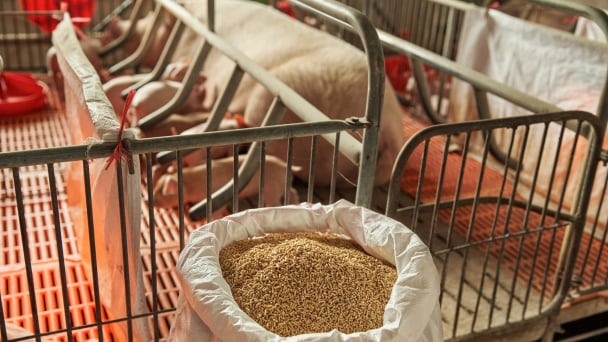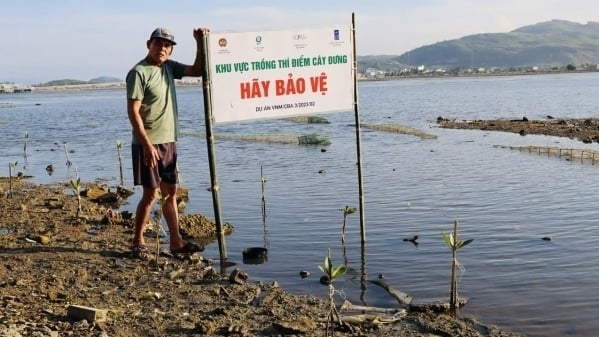May 22, 2025 | 00:58 GMT +7
May 22, 2025 | 00:58 GMT +7
Hotline: 0913.378.918
May 22, 2025 | 00:58 GMT +7
Hotline: 0913.378.918
The report highlights the necessity to rapidly propagate disease-free and mosaic-resistant varieties to serve production with the following specific options:

Lack of disease-free varieties, farmers in many localities are "taking risks" using varieties with unknown origins for production. Photo: VD.
- Regarding disease-free cassava propagation:
The scope of deployment is in mildly infected provinces, including Nghe An, Binh Thuan, Thanh Hoa, Ba Ria - Vung Tau, Binh Duong, Khanh Hoa, Thua Thien - Hue, Long An, Kon Tum, Quang Nam, Dak Lak , Binh Dinh, An Giang, Binh Phuoc, Quang Tri, Ninh Thuan, Ha Tinh, City. Ho Chi Minh.
+ Disease-free propagation method: Apply the disease-free propagation process issued by the Department of Crop Production. The main measure is selecting cassava fields with no disease or mild disease. Before harvesting, 100% of plants in the field are checked to remove and destroy plants with symptoms of Sri Lanka Cassava Mosaic Virus (SLCMV).
Encourage people to share disease-free seeds or arrange funds to buy seeds to distribute to households having seriously damaged cassava fields. Cassava having medium-severe disease must not be used as seed and need to be destroyed (shredded, dried) to prevent sprouting.
+ Implementation time: In 2022, organize training for farmers and build disease-free breeding models. In 2023, farmers themselves propagate on a large scale in all areas affected by SLCMV. District agriculture departments will be assigned with the prime responsibility for implementation.

The outbreak of Sri Lanka Cassava Mosaic Virus and loose association in production make many cassava growing areas minimised. Photo: VD.
+ Organisers: Provincial Departments of Agriculture and Rural Development are responsible for formulating plans and implementing them in the province; assigning the Provincial Agricultural Extension Center to coordinate with the Sub-Department of Cultivation and Plant Protection to build models and train disease-free propagation techniques in villages and communes with diseased cassava areas.
The Vietnam Cassava Association mobilizes its members to participate in disease-free breeding and support farmers with disease-free seed sources.
The Department of Crop Production, Department of Plant Protection, National Center for Agricultural Extension, Provincial Agricultural Extension Center, Provincial Sub-Department of Cultivation and Plant Protection, District Department of Agriculture, Plantation and Plant Protection Station/District Agricultural Service Center participate in the training and implementing of the propagation.
- Regarding disease-resistant breeding:
The scope of implementation is in severely infected provinces, including Tay Ninh, Phu Yen, Gia Lai, Dong Nai, and Quang Ngai.
+ Propagation method for disease resistance: the Institute of Agricultural Genetics propagates tissue culture with new varieties HN1, HN36, HN80, HN97 as the source of seeds for localities to continue propagating.

Rapid multiplication of disease-resistant and disease-free cassava varieties is an urgent requirement. Photo: TL.
With propagation using Tunnel greenhouses, the Institute of Agricultural Genetics offers training to transfer breeding technology to units that have Tunnel greenhouses.
Breeding in the field: Disease-resistant seeds, after being propagated in Tunnel greenhouses, are planted in the field to propagate in large numbers, together with new varieties HN1, HN36, HN80, HN97 and HN3, HN5 that are now available on the fields.
+ Implementation time: In 2022, organize training for units with tunnel greenhouses; propagating tissue culture supplies to units with Tunnel greenhouses and propagating in greenhouses to provide for the field propagation system.
In 2023, increase breeding capacity through improved technology and construction of more Tunnel greenhouses.
+ Organizer: the Institute of Agricultural Genetics acts as the focal point for tissue culture propagation with new varieties HN1, HN36, HN80, HN97 to supply units with Tunnel greenhouses.
The Institute of Agricultural Genetics provides training on technology transfer for the Institute of Agricultural Science and Technology of the South Central Coast, the University of the Central Highlands, the Quang Ngai Plant Breeding Center (currently having a tunnel greenhouse); Hung Loc and Tay Ninh Agricultural Experiment Center (which needs to build a new greenhouse).
Provincial Departments of Agriculture and Rural Development direct propagation in the field in the area when new varieties are provided, while encouraging cassava associations and enterprises to use tunnel greenhouses in Tay Ninh and provinces with high disease risks.
To Tay Ninh province, besides above contents, additional implementation needs to be carried out, including: investing in a system of 20 - 30 tunnel greenhouses for disease-resistant propagation from 2022; arranging a land fund of 200 - 500 ha and labor to rapidly propagate resistant varieties in the field; developing a plan to buy mildly infected and disease-free varieties in other localities for farmers to minimize damage caused by diseases. At the same time, the province should call on local cassava enterprises to participate in supporting the propagation of disease-free and disease-resistant varieties.
Translated by Phuong Ha

(VAN) CJ Feed&Care officially launched the FCR improvement campaign called “2025 Find Challenge Reach” in April 2025. In Vietnam, this campaign is implemented by CJ Vina Agri.

(VAN) The swamp in Pho Thanh is gradually being covered with red mangrove, creating a favorable environment for producing clean, high-quality salt.

(VAN) The trade turnover of agro-forestry-fishery products is growing significantly, along with investment cooperation commitments that are opening up new development directions between Vietnam and Russia.

(VAN) Khanh Hoa is investing over 545 billion VND to develop 240 hectares of high-tech marine aquaculture in order to guarantee a consistent supply of seafood exports and achieve the USD 1 billion target.

(VAN) Minister of Agriculture and Environment Do Duc Duy held a meeting with Soopakij Chearavanont, Chairman of C.P. Group, on May 15.
/2025/05/16/3800-0-nongnghiep-143756.jpg)
(VAN) Suntory PepsiCo Vietnam coordinated with the Ministry of Education and Training to implement an education program on water conservation, reaching nearly 1 million primary school students nationwide.

(VAN) Vietnam’s TH Group officially put its high-tech fresh milk processing plant into operation in the Russian Federation, marking a historic moment as the first TH true MILK cartons were produced in Russia.